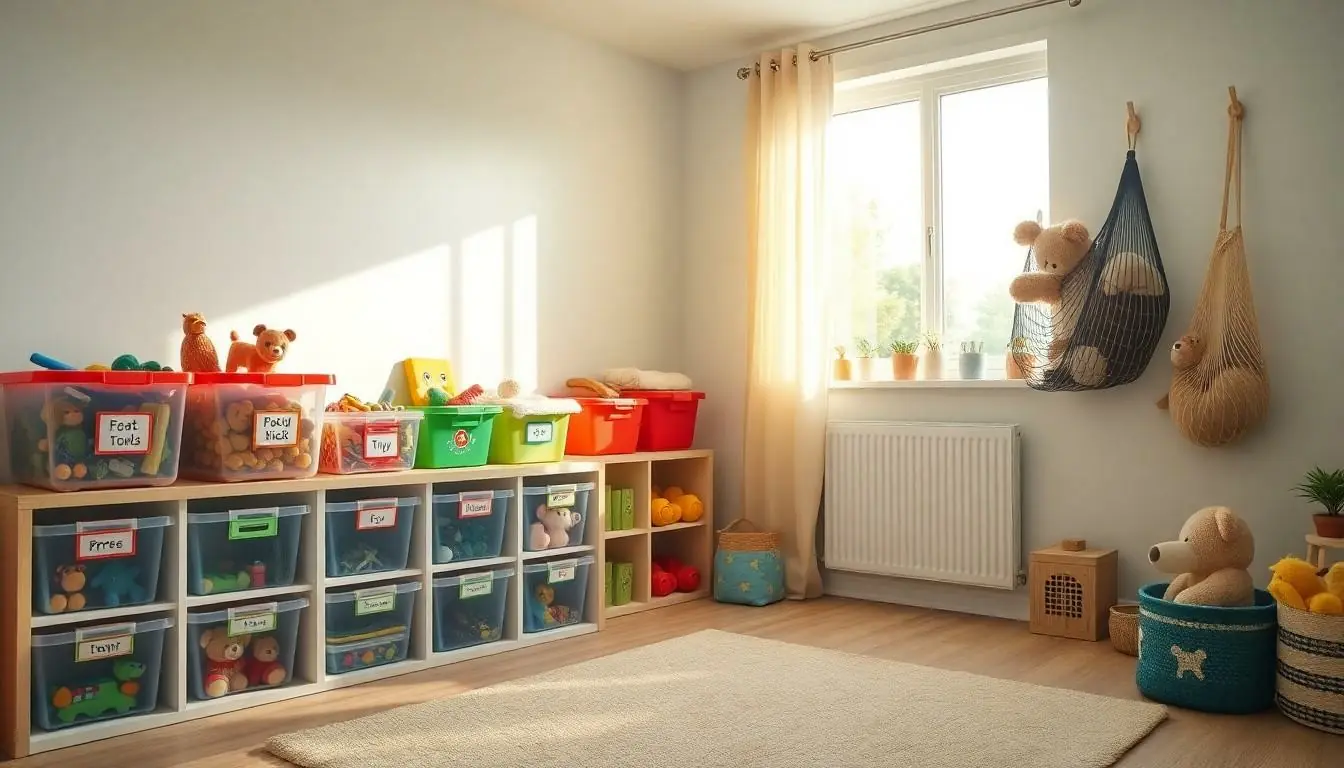Raising kids isn’t exactly a walk in the park – it’s more like trying to herd cats while juggling flaming torches. Every parent knows the daily struggle of managing tantrums keeping the house somewhat clean and maintaining their sanity all at once. But what if there were clever shortcuts to make this wild adventure a bit more manageable?
Enter parenting hacks: those brilliant time-saving game-changing tricks that experienced parents swear by. From turning mundane tasks into fun games to finding creative solutions for common challenges these smart strategies can transform chaotic moments into smooth sailing. Whether it’s getting picky eaters to try new foods or making bedtime less of a battlefield these practical tips help parents work smarter not harder.
Table of Contents
ToggleTime-Saving Tricks for Busy Parents
Efficient time management transforms chaotic parenting routines into streamlined processes. These practical strategies maximize productivity while maintaining quality family time.
Morning Routine Shortcuts
Organized morning routines start the night before with strategic preparation. Parents save 30 minutes each morning by laying out clothes, packing bags, and preparing lunch boxes in advance. Creating designated stations in the home—breakfast area, school supplies zone, shoe rack—reduces morning confusion and speeds up the getting-ready process. A visual checklist system using magnetic boards or wall charts guides children through their morning tasks independently. Setting clothes, backpacks, and essentials by the door prevents last-minute scrambling and cuts departure time by 15 minutes.
Meal Prep Strategies
Batch cooking on weekends creates 5-7 ready-to-heat meals for busy weeknights. Parents optimize kitchen time by chopping vegetables for multiple recipes at once, storing them in labeled containers. A rotating meal schedule featuring 10-12 family favorites eliminates daily decision-making about dinner choices. Freezer-friendly meals in portion-sized containers provide grab-and-go lunch options throughout the week. Creating snack stations with pre-portioned healthy options in clear containers allows children to help themselves while maintaining portion control.
Organization Hacks That Actually Work
Organization strategies create a calmer home environment by implementing systematic storage solutions. These practical approaches transform cluttered spaces into functional areas that enhance daily routines.
Toy Storage Solutions
Clear storage bins labeled with pictures enable toddlers to identify toy categories independently. Rotating toys between accessible bins maintains novelty while reducing clutter on display. Wall-mounted mesh bags store stuffed animals while magnetic strips display action figures. Installing low shelves gives children direct access to their favorite items during playtime. A designated “toy library” system limits the number of toys in circulation at once, making cleanup more manageable. Under-bed storage containers with wheels provide easy access to seasonal or less-used toys.
Kids’ Closet Management
Color-coded hangers separate clothing by type, making outfit selection straightforward for children. Installing a second closet rod doubles hanging space for smaller garments. Open-front bins organize socks, underwear, pajamas into accessible categories. Drawer dividers maintain folded clothes in neat sections. Designated baskets collect outgrown clothes for donation or storage. Clear shoe organizers display footwear options at child height. Weekly outfit bins streamline morning routines by pre-selecting coordinated clothing sets. A magnetic board tracks seasonal wardrobe items, indicating when replacements are needed.
Discipline and Behavior Management Tips
Creating consistent disciplinary approaches helps children understand expectations while building trust between parents and kids. These evidence-based strategies promote positive behavior through clear communication and logical consequences.
Positive Reinforcement Techniques
Positive reinforcement shapes desirable behaviors through immediate recognition and specific praise. Parents enhance effectiveness by creating behavior charts that track progress toward defined goals like completing homework or helping with chores. Small rewards, such as extra playtime or special privileges, motivate children to maintain good behavior. A token system allows kids to earn points for positive actions, exchangeable for predetermined rewards. Clear communication about expectations paired with consistent acknowledgment strengthens the parent-child relationship while building self-discipline.
Setting Effective Boundaries
Clear boundaries establish predictable routines that create security for children. Parents maintain consistency by implementing specific rules for different situations: bedtime routines, screen time limits, mealtime behaviors. Natural consequences teach responsibility when rules aren’t followed – losing device privileges follows excessive screen time. Age-appropriate boundaries evolve as children grow, with adjusted expectations for different developmental stages. A family meeting system creates opportunities to discuss rules, address concerns, and make collaborative adjustments that respect both parent authority and child autonomy.
Self-Care Strategies for Parents
Effective parenting starts with maintaining physical emotional well-being. Creating sustainable self-care practices enables parents to recharge their energy levels while managing daily responsibilities.
Quick Stress Relief Methods
Deep breathing exercises activate the body’s relaxation response in 3-5 minutes. Parents incorporate mindfulness through 60-second meditation breaks during daily routines like washing dishes or folding laundry. Progressive muscle relaxation reduces physical tension by systematically tensing muscle groups for 5 seconds then releasing. A brisk 10-minute walk around the block releases endorphins that boost mood instantly. Simple stretching exercises target common tension areas:
- Shoulder rolls: 10 repetitions forward backward
- Neck stretches: Hold each side 15 seconds
- Wrist hand stretches: Open close fingers 15 times
- Ankle rotations: 5 circles in each direction
Finding Personal Time
Parents optimize their schedules by identifying specific time blocks for self-care activities:
- Early morning: 20 minutes of exercise before children wake up
- Naptime: 30 minutes of reading meditation
- After bedtime: 45 minutes for hobbies creative pursuits
- Weekend swaps: Trading childcare duties with partner or friend for 2-3 hours
Creating boundaries helps protect these designated times:
- Setting automated “do not disturb” periods on devices
- Establishing quiet zones in specific house areas
- Communicating self-care needs during family meetings
- Using timers to maintain dedicated personal breaks
The key lies in scheduling these moments like any other important appointment incorporating them into daily routines.
Travel and On-the-Go Solutions
Traveling with children requires strategic planning to ensure smooth journeys. These practical solutions transform challenging travel situations into manageable experiences.
Road Trip Essentials
A well-organized car setup creates a comfortable travel environment for children. Clear storage containers labeled for snacks, activities, and emergency supplies fit neatly between seats or in door compartments. A backseat organizer holds tablets, books, and water bottles within easy reach. Pack individually portioned snack bags to control mess and consumption. Create activity bags with age-appropriate items: magnetic games, coloring supplies, or puzzle books. Install a portable trash container to maintain cleanliness during long drives. Keep a first-aid kit, wet wipes, and spare clothes in an accessible location. Use window shades to regulate temperature and reduce glare on screens. Place a waterproof mat under car seats to protect upholstery from spills.
Restaurant Survival Guide
Restaurant success starts with strategic timing and seating choices. Request corner tables or booths to contain active children. Pack quiet activities in small bags: crayons, sticker books, or mini play-dough containers. Order appetizers immediately to minimize waiting time. Select sharing plates to accommodate picky eaters. Bring disposable placemats to create clean eating surfaces. Choose restaurants with quick service during peak meal times. Keep sanitizing wipes handy for messy hands and faces. Use silicone placemats with catch pockets to prevent food spills. Store an emergency snack pack for delayed orders. Select establishments with reasonable noise levels to avoid overstimulation.
Money-Saving Parent Hacks
Strategic financial planning transforms expensive parenting costs into manageable expenses. These practical solutions create substantial savings while maintaining quality family experiences.
Budget-Friendly Activities
Free community events offer enriching entertainment options for families throughout the year. Local libraries host storytimes, craft sessions, and educational workshops at no cost. Parks provide natural playgrounds, hiking trails, and picnic areas for outdoor adventures. Many museums feature free admission days, typically during weekday afternoons or specific monthly dates. Community centers organize affordable classes, sports programs, and seasonal activities for children of all ages. Parents create engaging home-based activities using household items like cardboard boxes for creative play, kitchen ingredients for science experiments, and recycled materials for art projects.
Smart Shopping Tips
Bulk purchasing reduces costs on frequently used items like diapers, wipes, and non-perishable snacks. Parents save significantly by buying children’s clothes during end-of-season sales and clearance events. Second-hand stores, online marketplaces, and consignment shops offer quality items at reduced prices. Price comparison apps track deals and alert shoppers to discounts on essential items. Loyalty programs at grocery stores and retailers provide cash back, points, and exclusive member savings. Meal planning based on store sales cuts grocery expenses while maintaining nutritious options. Parents organize buying groups to share bulk purchases and split costs on larger items.
Conclusion
Parenting hacks are more than just clever tricks – they’re essential tools that transform daily challenges into manageable tasks. These practical strategies help create smoother routines efficient organization and stronger family bonds while preserving parents’ sanity.
The key to successful parenting isn’t about being perfect but rather about finding smart solutions that work for each unique family situation. By implementing these tested strategies parents can create a more balanced enjoyable and sustainable approach to raising their children.
Remember that even small changes in routine and organization can lead to significant improvements in family life. With these parenting hacks families can spend less time on struggles and more time creating precious memories together.







